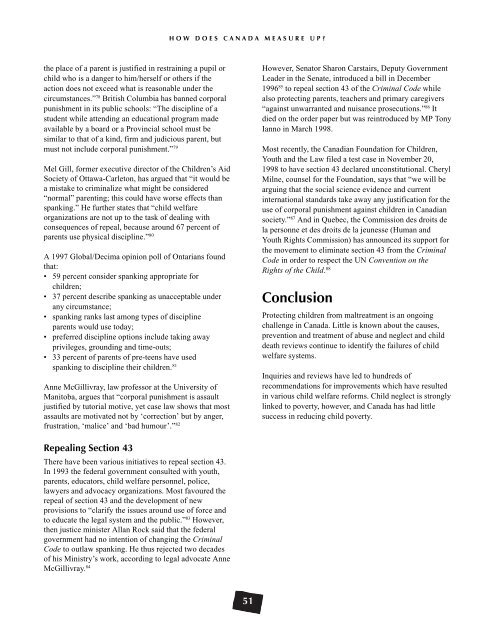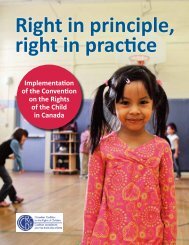Poste - Canadian Coalition for the Rights of Children
Poste - Canadian Coalition for the Rights of Children
Poste - Canadian Coalition for the Rights of Children
You also want an ePaper? Increase the reach of your titles
YUMPU automatically turns print PDFs into web optimized ePapers that Google loves.
<strong>the</strong> place <strong>of</strong> a parent is justified in restraining a pupil or<br />
child who is a danger to him/herself or o<strong>the</strong>rs if <strong>the</strong><br />
action does not exceed what is reasonable under <strong>the</strong><br />
circumstances.” 78 British Columbia has banned corporal<br />
punishment in its public schools: “The discipline <strong>of</strong> a<br />
student while attending an educational program made<br />
available by a board or a Provincial school must be<br />
similar to that <strong>of</strong> a kind, firm and judicious parent, but<br />
must not include corporal punishment.” 79<br />
Mel Gill, <strong>for</strong>mer executive director <strong>of</strong> <strong>the</strong> <strong>Children</strong>’s Aid<br />
Society <strong>of</strong> Ottawa-Carleton, has argued that “it would be<br />
a mistake to criminalize what might be considered<br />
“normal” parenting; this could have worse effects than<br />
spanking.” He fur<strong>the</strong>r states that “child welfare<br />
organizations are not up to <strong>the</strong> task <strong>of</strong> dealing with<br />
consequences <strong>of</strong> repeal, because around 67 percent <strong>of</strong><br />
parents use physical discipline.” 80<br />
A 1997 Global/Decima opinion poll <strong>of</strong> Ontarians found<br />
that:<br />
• 59 percent consider spanking appropriate <strong>for</strong><br />
children;<br />
• 37 percent describe spanking as unacceptable under<br />
any circumstance;<br />
• spanking ranks last among types <strong>of</strong> discipline<br />
parents would use today;<br />
• preferred discipline options include taking away<br />
privileges, grounding and time-outs;<br />
• 33 percent <strong>of</strong> parents <strong>of</strong> pre-teens have used<br />
spanking to discipline <strong>the</strong>ir children. 81<br />
Anne McGillivray, law pr<strong>of</strong>essor at <strong>the</strong> University <strong>of</strong><br />
Manitoba, argues that “corporal punishment is assault<br />
justified by tutorial motive, yet case law shows that most<br />
assaults are motivated not by ‘correction’ but by anger,<br />
frustration, ‘malice’ and ‘bad humour’.” 82<br />
Repealing Section 43<br />
There have been various initiatives to repeal section 43.<br />
In 1993 <strong>the</strong> federal government consulted with youth,<br />
parents, educators, child welfare personnel, police,<br />
lawyers and advocacy organizations. Most favoured <strong>the</strong><br />
repeal <strong>of</strong> section 43 and <strong>the</strong> development <strong>of</strong> new<br />
provisions to “clarify <strong>the</strong> issues around use <strong>of</strong> <strong>for</strong>ce and<br />
to educate <strong>the</strong> legal system and <strong>the</strong> public.” 83 However,<br />
<strong>the</strong>n justice minister Allan Rock said that <strong>the</strong> federal<br />
government had no intention <strong>of</strong> changing <strong>the</strong> Criminal<br />
Code to outlaw spanking. He thus rejected two decades<br />
<strong>of</strong> his Ministry’s work, according to legal advocate Anne<br />
McGillivray. 84<br />
H O W D O E S C A N A D A M E A S U R E U P ?<br />
51<br />
However, Senator Sharon Carstairs, Deputy Government<br />
Leader in <strong>the</strong> Senate, introduced a bill in December<br />
1996 85 to repeal section 43 <strong>of</strong> <strong>the</strong> Criminal Code while<br />
also protecting parents, teachers and primary caregivers<br />
“against unwarranted and nuisance prosecutions.” 86 It<br />
died on <strong>the</strong> order paper but was reintroduced by MP Tony<br />
Ianno in March 1998.<br />
Most recently, <strong>the</strong> <strong>Canadian</strong> Foundation <strong>for</strong> <strong>Children</strong>,<br />
Youth and <strong>the</strong> Law filed a test case in November 20,<br />
1998 to have section 43 declared unconstitutional. Cheryl<br />
Milne, counsel <strong>for</strong> <strong>the</strong> Foundation, says that “we will be<br />
arguing that <strong>the</strong> social science evidence and current<br />
international standards take away any justification <strong>for</strong> <strong>the</strong><br />
use <strong>of</strong> corporal punishment against children in <strong>Canadian</strong><br />
society.” 87 And in Quebec, <strong>the</strong> Commission des droits de<br />
la personne et des droits de la jeunesse (Human and<br />
Youth <strong>Rights</strong> Commission) has announced its support <strong>for</strong><br />
<strong>the</strong> movement to eliminate section 43 from <strong>the</strong> Criminal<br />
Code in order to respect <strong>the</strong> UN Convention on <strong>the</strong><br />
<strong>Rights</strong> <strong>of</strong> <strong>the</strong> Child. 88<br />
Conclusion<br />
Protecting children from maltreatment is an ongoing<br />
challenge in Canada. Little is known about <strong>the</strong> causes,<br />
prevention and treatment <strong>of</strong> abuse and neglect and child<br />
death reviews continue to identify <strong>the</strong> failures <strong>of</strong> child<br />
welfare systems.<br />
Inquiries and reviews have led to hundreds <strong>of</strong><br />
recommendations <strong>for</strong> improvements which have resulted<br />
in various child welfare re<strong>for</strong>ms. Child neglect is strongly<br />
linked to poverty, however, and Canada has had little<br />
success in reducing child poverty.




